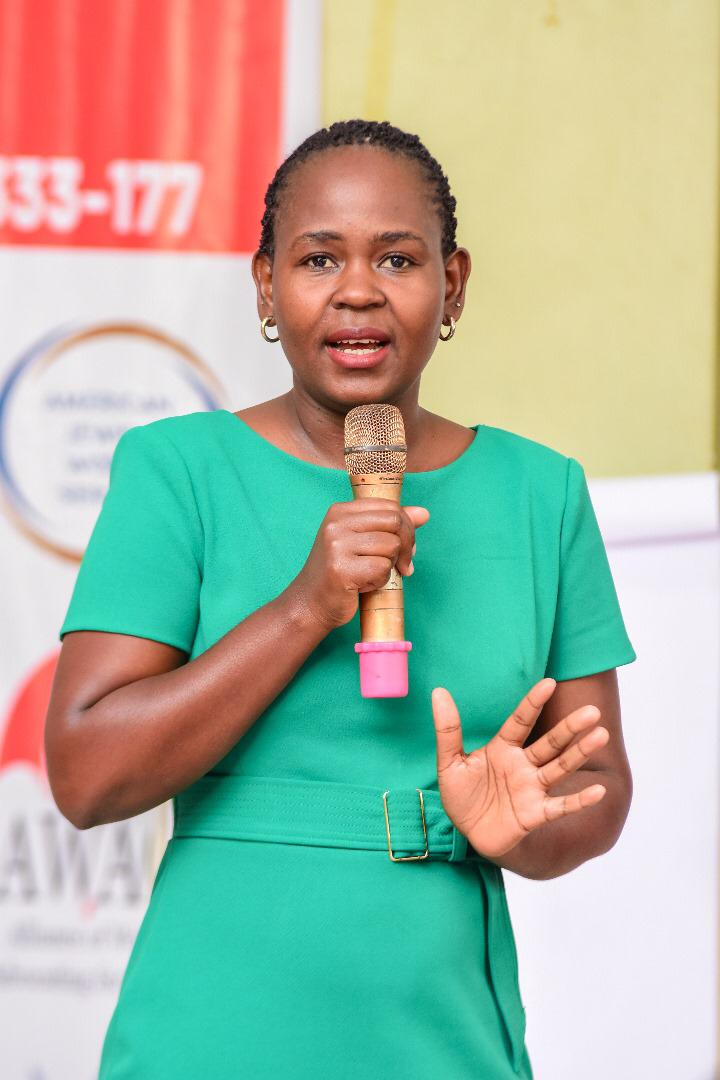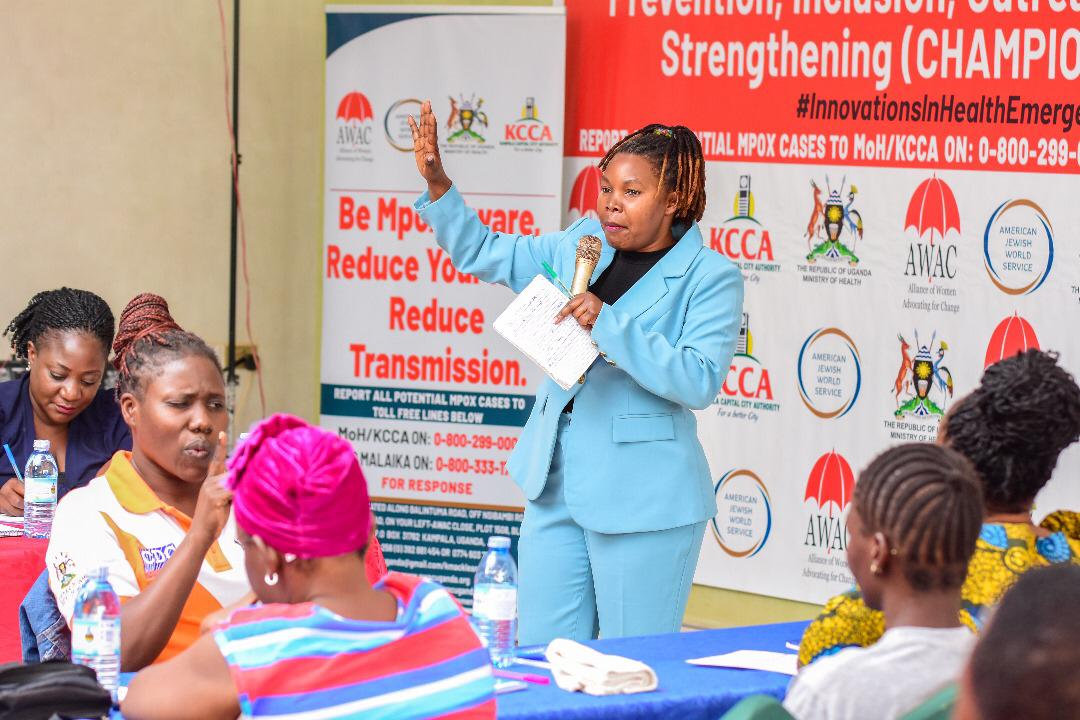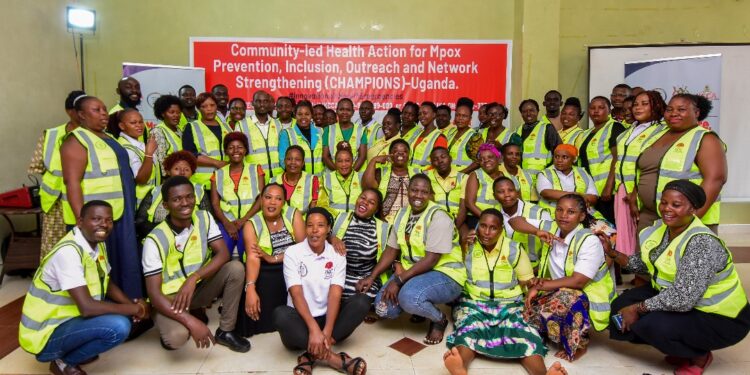Under the banner of resilience and advocacy, the Alliance of Women Advocating for Change (AWAC) has risen to amplify the voices of Female Sex Workers (FSWs), urging the government and stakeholders to recognize them as pivotal allies in combating the Mpox outbreak.
This heartfelt appeal resonated on Wednesday during a transformative workshop themed “Community-Led Health Action for Mpox Prevention, Inclusion, and Network Strengthening” (CHAMPIONS Uganda). Held at OK Hotel in Kampala, the workshop brought together key players, including representatives from the Ministry of Health, Kampala Capital City Authority (KCCA), and grassroots leaders within the sex work community, uniting in a shared mission of inclusion and action.
Macklean Kyomya, Executive Director of AWAC, emphasized the importance of involving sex workers in the fight against public health emergencies, noting that they often bear the brunt of stigma during outbreaks.
“Every time there is an epidemic, sex workers are labelled as vectors of disease,” said Kyomya. “While we acknowledge the science indicating the spread of Mpox within our community, we are calling for targeted interventions to empower us to play a leading role in prevention and response.”

AWAC currently operates in 57 districts, supporting Female Sex Workers, including those with disabilities, those who use and inject drugs, and adolescent girls involved in transactional sex. Kyomya expressed frustration over the lack of resources and tailored interventions to address the challenges faced by sex workers amidst the Mpox outbreak.
“We are not seeing investments directed towards sex work constituencies. If the data shows that sex workers are at higher risk, why aren’t resources being allocated to empower us with protective gear, educational materials, and drop-in centres to mitigate the spread?” she questioned.
Kyomya highlighted the critical role of sex workers as peer educators, outreach workers, and community advocates. She underscored their ability to disseminate information and create awareness within their communities, a role often overlooked by policymakers and donors.
“Nothing about us without us,” she stated. “If we are truly at the centre of this health crisis, let us take the wheel. We know what needs to be done for our constituencies and the broader community.”
She pointed out parallels between the current Mpox outbreak and the early days of the HIV epidemic, where sex workers were similarly stigmatized but not adequately supported.
The workshop participants called on the Ministry of Health, international donors, and other stakeholders to prioritize funding and capacity-building initiatives targeting sex workers. They stressed the need for responsive and targeted interventions, including public awareness campaigns and protective resources tailored to their unique vulnerabilities.
“We are tired of being judged as the problem without being given the tools to be part of the solution,” Kyomya said. “It is high time we were treated as partners in public health emergencies.” AWAC’s partnership with AJWS has enabled the sensitization of 63 female sex workers, but Kyomya noted that much more needs to be done.
“This is just the beginning,” she said. “With adequate resources and collaboration, sex workers can significantly contribute to reducing new infections and safeguarding public health.”

Despite the limited funding and being excluded from the response country’s strategies, Kyamya noted that, as a sex worker advocacy movement, AWAC has made significant efforts to empower sex workers by providing them with information and protective gear to prevent the spread of Mpox.
“We have empowered our community, a few of the peer leaders, to actually on how to do the screening, that big fear that we had that would see someone and distance completely has not happened because we were equipped with the messages and information that we can protect ourselves as peers, make sure that we have sanitisers. We have mapped different government facilities that we can work with, but also we are working with the focal persons of those facilities to refer, especially government facilities, to refer cases of suspected cases, Mpox cases, to those facilities,” she said.
Dr. Emilly Tumwakire, the head of the community engagement pillar for responses at the Ministry of Health who was one of the facilitators of the workshop explained to FSWs how Mpox is transmitted and encouraged them to lead the fight against this epidemic.
On Ms Kyamya’s plea, Dr Tumwakire pledged that the Ministry of Health would organize a training session to conduct screenings and involve sex workers directly as part of the Mpox response team. Also revealed that the Ministry of Health is now rolling out strategies to manage these patients in the in the in the districts. “So we have asked all health centres fours and above health centre for district hospitals to at least set aside an isolation section, a minimum of two beds, and it’s an isolated place where they can be able to manage patients that are presenting with Mpox.”
On including FSWs on the response team in the fight against Mpox, Dr Tumwakire promised that the ministry would engage them and work together.
“I’ve noticed that the commercial sex workers have noted, the interest to be part of the response, and one of them is for example, that they’ve noted if they would like to participate in the screening of potential patients of people with Mpox so that one has been taken, and they’ve told me they have peer educators who have been doing that kind of work. I want the Ministry of Health to organise a meeting with them, to be able to screen because it’s easier a colleagues to do the screening than us strangers, which is something that we’re going to work on to ensure that they are also actively involved.” She added.
She however urged the female sex workers to prioritize their health and safety above financial gains. She encouraged them to become ambassadors in the fight against Mpox by promptly reporting any suspected cases. If they observe signs or symptoms of Mpox in a client, she advised them to refrain from engaging with such clients, even if monetary offers are involved, to safeguard their well-being and that of the community.
“If you have a client that you suspect, most likely has Mpox symptoms, don’t service that client that day, because you might be wanting to make lots of money but of that value will that money that you’ve made from that client, compared to your life, and you die. So, the best way is if you’d alert the health officials that patient can be attended to them you suspected to have Mpox.”
Do you have a story in your community or an opinion to share with us: Email us at editorial@watchdoguganda.com













